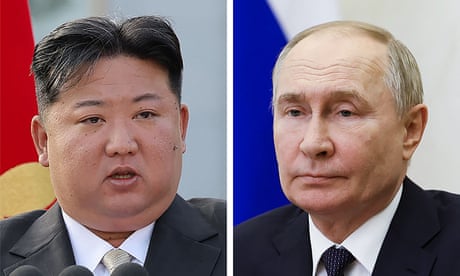Russian leader will have talks with Kim Jong-un with shared aim of expanding security and economic cooperation
Vladimir Putin has praised North Korea for supporting Russia’s war in Ukraine, as he travels to Pyongyang to seek continued military support from one of the world’s most isolated nations.
In his first visit to North Korea since 2000, Putin will meet Kim Jong-un for one-on-one talks in Pyongyang as the two leaders pledge to expand their security and economic cooperation in defiance of Western sanctions against both countries.
Putin is expected to arrive in North Korea late on Tuesday, Agence France-Presse reported, with a large entourage of government ministers and advisers, including those responsible for the Russian military and weapons procurement. They include his new defence minister, Andrey Belousov, and Denis Manturov, his top deputy prime minister overseeing the defence sector.
In an article written for Korea’s Central News Agency on Tuesday, Putin praised North Korea for “firmly supporting” Moscow’s war in Ukraine, writing that he plans to lift relations with Pyongyang to a higher level.
“The program is very full,” said Kremlin aide Yuri Ushakov. “A considerable amount of time will be dedicated to informal contacts between the leaders, as these negotiations … will contain the most important and most sensitive questions.”
It is a rare trip abroad for Putin, who has limited his international travel to friendly countries since he launched the full-scale invasion and became the subject of an international criminal court arrest warrant for the mass deportation of children from Ukraine to Russia.
North Korea has supplied Russia with millions of rounds of Soviet-era artillery munitions as a crucial lifeline to prop up the Russian military campaign in Ukraine. The US secretary of defence, Lloyd Austin, last month told lawmakers that the supplies of munitions and missiles, as well as Iranian drones, had helped the Russian military “get back up on their feet”.
North Korea has also provided Russia with ballistic missiles and electronic equipment used in the war effort.
In return, Russia is believed to have provided aid to North Korea’s satellite programme, as well as other arms, economic aid and diplomatic support. Kim visited Russia’s Far East last year, meeting Putin in Vladivostok during a trip where he visited a factory producing modern fighter jets and the Vostochny Cosmodrome.
The White House said on Monday that Washington is apprehensive over closer ties between Russia and North Korea.
“We’re not concerned about the trip [by Putin],” National Security Council spokesperson, John Kirby, told reporters Monday. “What we are concerned about is the deepening relationship between these two countries.”
Kirby said the worry was not just that “North Korean ballistic missiles are still being used to hit Ukrainian targets, but because there could be some reciprocity here that could affect security on the Korean peninsula”.
Citing a Kremlin aide, Russian agencies said Monday the two leaders will sign “important documents” during the visit.
This may include a “comprehensive strategic partnership treaty” which will outline future cooperation and deal with “security issues”, Kremlin aide Yuri Ushakov was quoted as saying by state-run Russian news agencies.
But experts said that in reality, any new agreements would be focused on boosting the two countries’ defence cooperation.
“Moscow and Pyongyang want to leverage the perception that their ties are long-term and increasingly integrated regarding defence,” Patrick Cronin, chair for Asia-Pacific Security at the Hudson Institute, told the Yonhap news agency.
“They may also suggest this relationship is comprehensive. Certainly, both countries are facing serious economic dilemmas. But regardless of the words used, current relations will focus on defence cooperation.”
South Korean defence minister Shin Wonsik said in an interview with Bloomberg News that Seoul had identified at least 10,000 shipping containers suspected to be containing artillery ammunition and other weapons sent from North Korea to Russia.
Those containers could contain as much as 4.8m shells, Shin said. EU countries have struggled to meet the goal of supplying 1m artillery shells to Ukraine over the past year, sending just half of that amount.
“Putin is expected to seek closer security cooperation with North Korea, especially military supplies such as artillery shells that are necessary to seize a chance to win,” Shin told Bloomberg News.
Source: The Guardian












Recent Comments